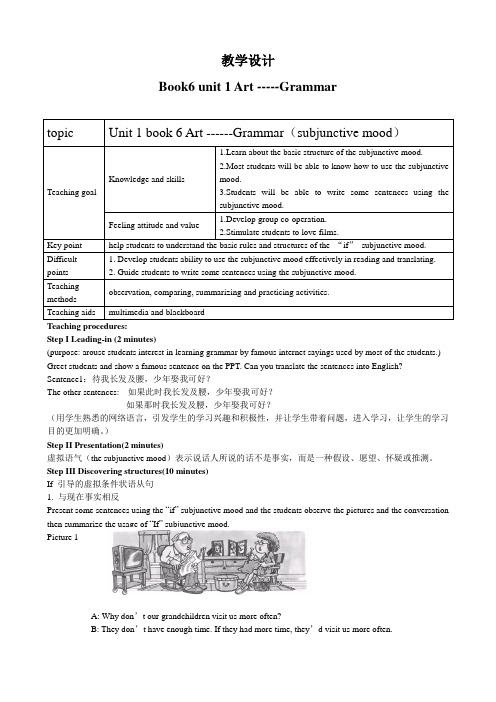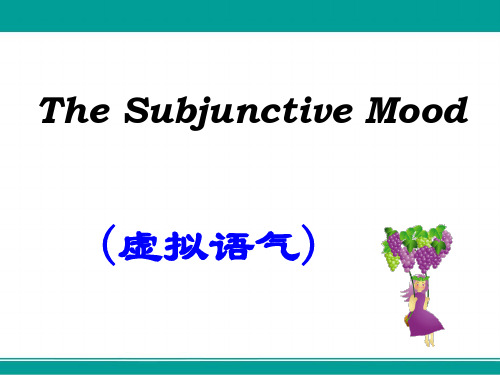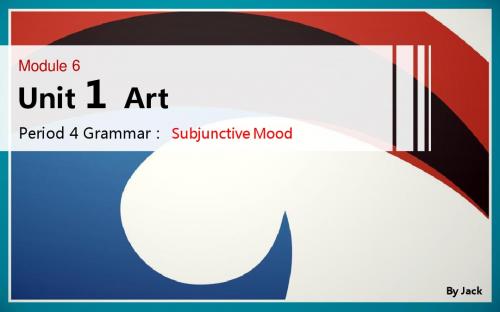人教版选修6Unit-Art-Grammar-Subjunctivemood虚拟语气
Unit 1 book 6 Art ------Grammar(subjunctive mood)

教学设计Book6 unit 1 Art -----GrammarTeaching procedures: Step I Leading-in (2 minutes)(purpose: arouse students interest in learning grammar by famous internet sayings used by most of the students.) Greet students and show a famous sentence on the PPT. Can you translate the sentences into English? Sentence1:待我长发及腰,少年娶我可好?The other sentences: 如果此时我长发及腰,少年娶我可好?如果那时我长发及腰,少年娶我可好?(用学生熟悉的网络语言,引发学生的学习兴趣和积极性,并让学生带着问题,进入学习,让学生的学习目的更加明确。
)Step II Presentation(2 minutes)虚拟语气(the subjunctive mood )表示说话人所说的话不是事实,而是一种假设、愿望、怀疑或推测。
Step III Discovering structures(10 minutes)If 引导的虚拟条件状语从句1. 与现在事实相反Present some sentences using the “if ” subjunctive mood and the students observe the pictures and the conversation then summarize the usage of “If ” subjunctive mood.Picture 1A: Why don ’t our grandchildren visit us more often?B: They don ’t have enough time. If they had more time, they ’d visit us more often.topic Unit 1 book 6 Art ------Grammar (subjunctive mood )Teaching goal Knowledge and skills 1.Learn about the basic structure of the subjunctive mood.2.Most students will be able to know how to use the subjunctivemood.3.Students will be able to write some sentences using thesubjunctive mood.Feeling attitude and value1.Develop group co-operation.2.Stimulate students to love films. Key pointhelp students to understand the basic rules and structures of the “if ” subjunctive mood. Difficultpoints1. Develop students ability to use the subjunctive mood effectively in reading and translating.2. Guide students to write some sentences using the subjunctive mood. Teachingmethodsobservation, comparing, summarizing and practicing activities. Teaching aids multimedia and blackboardPicture 2A: I wonder why Fred works so hard.B: I don’t know. He must like his job.A: If he didn’t like his job, he wouldn’t work so hard.Picture 3A: It was a pity that we lost the game.B:Yeah. If Jack had scored that goal, we could have won.Questions: 1.找到if 条件句,归纳if条件句的谓语动词形式2.找到主句,归纳主句的谓语动词形式3.虚拟语气在if条件句中的用法。
人教版高中英语选修6课件unit1artgrammar虚拟语气

something.(say)
5).It’s high time +that - did should do
你该走了。
It’s high time that you __w_e_n_t ___. (go)
3. without和but for 等构成的含蓄虚拟条件句。
Without sunlight, people’s life would be different from today. But for your help, I wouldn’t have finished the work.
含蓄虚拟条件句指句中没有明显的虚拟条件句,而是通过其他 方式(介词或介词短语,连词:but, otherwise等)来暗示存 在虚拟条件。这类条件句可以转化为if引导的条件句。
2. 虚拟语气的倒装 If I were a teacher, I would have lots of students. _W_e_r_e_ I a teacher, I would have lots of students.
If I had entered rui’an high school, I would not sit here now.
The Subjunctive Mood
(虚拟语气)
1、If 虚拟条件状语从句
含义 If 从句谓语 主句谓语形式
动词
与现在 事实相
反
were did
might/should would/could+ do
例句
If I were a teacher, I would not leave much homework
选修六 Unit1 Art Grammar Subjuctive Mood

1. I wish every day were my birthday.
从句动作与主句动作同时发生 从句动作先于主句动作发生
2. I wish I hadn’t made such a mistake. 3. We wish our parents wouldn’t punish us.
将来不大可能实现的愿望
Practice
She insisted that she was right. 她坚持认为自己是对的。(坚持事实) His uncle insists that he should not stay in the hotel. 他的叔叔坚持要求他不要待在旅馆里。 The look on his face suggested that he was unhappy. I suggested that the teachers' wages (should) be increased.
Practice
obey 1. The guard at gate insisted that everybody ______ (obey) the rules. be sent was 2. He insisted that she ____ (be)seriously ill and that _______ (send) to hospital at once. have 3. He suggested that we ______ (have) a meeting at once. was 4. His pale face suggested that he ______ (be) ill.
Practice
以上动词相应的名词构成的名词性从句包括主语从句, 表语从句和 同位语也要使用虚拟语气, 从句中的动词形式为(should)+动词原形
人教版高中英语选修六:Unit2SubjunctiveMood教学案例(全国一等奖).doc

《English Grammar: 66SubjunctiveMood”》教学案例分析English Grammar:u subjunctive mood”“虚拟语气”教学案例分析一、案例背景本节课是以学生为出发点,采用任务型教学方法,自主、合作学习方法,对学生进行知识与能力的培养。
“新课标”倡导任务型教学途径,即根据学习内容设计各种交际任务,让学生通过完成这些任务进行学习,学会用英语做事,以培养学生综合运用语言的能力。
任务型教学认为课堂教学要有真实的生活特征,本单元语法“虚拟语气”适合于创设各种情境,从而能够激发学生的兴趣和引起其主动参与语言实践活动的欲望。
基于这一特点可以把教材拓展到学生生活实际,实现教学的生活化,实用化。
因此在本节课中以虚拟语气的含义和构成为主线,创设不同的情境,在不同语境中使学生通过交流合作达到对虚拟语气的掌握。
二、教学内容New Senior English for China Student^ Book 6Unit2——English Grammar: “ subjunctive mood "三、教法分析任务教学法(task・based teachin g and learning method)合作学习(cooperative learning)四、教学目标1.Knowledge aim:Get the students to learn the useful new structures in subjunctive mood ・2.Ability aim:How to use this structure in daily life.3.Emotional aim:Learn to cooperate with others・五、教学过程及分析Step 1 Warming up Ask the students to go back to page 10 and study of list poems, poem c our first fo otball match and translate it into Chinese, paying special attention to its verb forms: we would have won ................................... if jack had scored th at goal, if we'd hadjust a few more minutes, if we had trained harder, if ben had passed the ball to joe, if we'd had thousands of fans screaming, if i hadn't taken my eye off the ball, if we hadn't stayed up so late the night before, if we hadn9t taken it easy, if we hadn't run out of energy, ..... w e would have won if we'd been better! 分析:学生在imitl已经了解到英语的动词一般有三种不同的语气:陈述语气、祈使语气和虚拟语气。
高中英语人教版选修6Unit1ArtGrammar教案(系列三)

unit 1 ArtGrammar Subjunctive Mood with“if”Clause教案六.教学步骤□(group work) 〓(pair work) ♀(individual work)自我评价表七.课后反思本节课能以学生为中心,通过开展一系列的教学活动培养学生的自主探究学习、合作学习能力。
其中我觉得有以下几个方面做得较好:1. 利用多媒体技术创设生动活泼的语言情景操练语法项目,提供更多的信息资源,可以激发学生学习英语的强烈兴趣;同时也避免了英语课上总是围绕课本机械操练,重复旧内容的旧模式;并且通过合理设计,达到课堂内容的高密度,让学生在短时间内掌握更多的知识点。
这种形象、生动而又直观的语法教学方式,很符合语言学习的规律,可以在很大程度上提高学生学习英语的综合能力。
多媒体教学进入课堂是十分可行又十分必要的。
正确、合理的利用它将会创造出更和谐、快乐、实效的英语大课堂。
2. 打破传统的以教师传授为中心的语法教学规律,运用归纳法,通过创设大量贴近学生生活的情景,对“if”虚拟语气的结构进行归纳,其间,大胆引用电影“Titanic”的故事情节进行大量的假设训练,增加了语法学习的趣味性。
最后结合近几年广东高考对该语法项目的考查,进行写作训练,整节课贯穿“听,说,读,写”等基本技能的训练,浑然一体,实现了语法的“三维教学”。
课堂设计注重学生的主体作用,培养学生的自主学习和合作学习能力。
3. “分层”教学是我校“目标体验教学模式”中的一大亮点。
其要求练习设计要分难易,使每个学生都能根据自己的学习情况,选择适合自己的练习,体验到学习的成功感和快乐。
练习设计由浅入深,层层深入。
我想,在日常的教学活动中,如何设计好分层教学的练习是我们备好每一节课的关键。
这节课我感受到的是学生的创造力和师生共同营造的集体合力,如果每一节语法课我们都能使它变得如此生动活泼,简明易懂的话,语法课的“有效教学”离我们还会远吗?。
人教版(新课程标准)选修6Unit1ArtGrammar虚拟语气课件

宾语从句不用虚拟语气。
C 虚拟语气用在主语从句时,表示惊讶、不相信、惋惜等情绪
主语从句的常见句式有:
1. “It is/was+ 形容词+that+ sb.+(should)+ 动词原形+ 其它”句式。 常见的此类形容词有:necessary, essential, impossible, natural, strange, proper, appropriate等。
were am
would have picked
if和even if/even though的虚拟
虚拟语气
与现在的事 实相反
条件从句中的谓语动 词
一般过去时(be用 were)
主句中的谓语动词
would/should/could/might +动词原形
与过去的事 had+ 过去分词 实相反
would/should/could/might + have+过去分词
反
与将来的事实相 一般过去时(be用were)
反
should + 动词原形were to+
动词原形
would/should/could/might+动词 原形
would/should/could/might+ have+过去分词 would/should/could/might+动词 原形
【变式训练一】语法填空
(一)虚拟语气用于状语从句
If 引导的条件状语从句和even if /even though引导的让步状语从句,当从 句表示不能实现或实现的可能性很小的时候,从句需要使用虚拟语气。 用法如下:
高中英语人教版选修6Unit1ArtGrammar教案(系列二)
unit 1 ArtGrammar虚拟语气Subjunctive Mood教案一:分类1在英语中有三种语气,陈述语气,祈使语气和虚拟语气2 虚拟语气表示说话的人的一种愿望、意见、命令、要求,有时候是一种非真实的假设、料想或者是不可能实现的与事实相反的愿望。
二、形式虚拟语气经常用在if引导的条件状语从句中,在条件句中做出和事实不相符的一种假设。
a.和现在事实相反的假设如:If I were you, I would study hard.If he had enough money, he would buy a puter.b.和过去事实相反的假设如:If you had e five minutes earlier, you would have met him.If they had been treated in time, they would not have died.c.和将来事实相反的假设如:If I were to do it, I would do it in another day.If it rained tom orrow, we wouldn’t be able to go on piic.d.混合条件句混合条件句是指条件句是对过去事实相反的假设,而主句则表示现在的某种情况。
三、注意事项①如果从句中有were、had或者should时,则可以省略if,并将were、had或者should提前至句首,构成部分倒装,但如果是否定句,则否定词not不提前。
如:Were I to be young again, I would study medicine.=If I were to be young again, I would study medicine.Had you not left so early, you might have missed the train.=If you had not left so early, you might have missed the train.②用介词短语代替条件状语从句,常用的介词有with, without, but for.如:Without your help, we couldn’t have finished the work ahead of time.=But for your help, we couldn’t have finished the work ahead of time.=If it had not been for your help, we couldn’t have finished the work ahead of time.=Had it not been for your help, we couldn’t have finished the work ahead of time.③在句中出现了表示转折的连词,如or, or else, otherwise等,如果句意和事实不符也要用虚拟语气。
人教版高中英语选修六unit 1 art grammar虚拟语气教学课件(共19张PPT)
Definition
虚拟语气(Subjunctive mood) 虚拟语气是一种特殊的动词形式,用来表示说
话人所说的话不是事实,而是一种假设、猜测、怀
疑等;或是表示说话人的愿望、要求、命令、建议
等。
1. If he doesn’t hurry up, he will miss the bus. ( 真实 ) 2. If I were you, I would go at once. ( 虚拟 )
②should + do would / could / might ③were to do / should + do
1.假如我是一只小鸟,我就能在空中自由地飞翔了。
Translation:
If I ______ were a bird, I could fly in the sky freely. ___________ If I ___________ had met you yesterday, we could have gone _____________________ to see the film together. If I _____ had a lot of money, I would travel around ______________ the world.
1) If I had got there earlier, I could have met her. 2) If he had taken my advice, he would not have made such a mistake. 主从 成 句 时态 过去 与_____ 事实相反 的假设
1) If he came tomorrow, we would have a meeting.
高中英语人教版选修六Unit 1 Art Grammar subjective mood教案
Book 6 Unit 1 ArtPeriod 5 Grammar: subjective mood学习目标 1.记住虚拟语气的使用规则和场合。
2.能够地道的运用虚拟语气,以增强社交能力。
学法指导1.仔细阅读课本和练习册中的语法讲解部分,用红笔画出重点语法规则。
2.利用导学案总结归纳虚拟语气的用法和具体场合。
3.通过导学案和练习册中的相关练习题进行实践应用。
知识链接Task 1 Check and revise(完成句子)1)I passed my driving test________________________.(我考汽车驾驶执照一次就通过了)2)Many people _________________________________ losing their parents in the earthquake.(渴望收养在地震中失去双亲的孩子)3)She made __________________________________________(向他求助).4)After ______________________________(大量的训练之后), he runs_____________________________________(比以前快多了) than before.5)Many college graduates are out of work now, _________________________(但另一方面), they won’t take jobs that do not pay much.Task 2 Lead in课前自主学习:1.【概念】英语中的语气分为三种,分别为____________、____________、____________。
陈述语气用来__________________________________________________________;祈使语气用来__________________________________________________________;虚拟语气用来表示_______________、与______________或_______________情况;或_________________及______________________________.虚拟语气是通过___________________来表示的。
人教版高中英语选修六Unitgrammar教学课件
5. At last, the rescue workers came and saved Rose. If the rescue workers hadn’t come, Rose would not have been saved.
he _w_o_u_ld_b_e_(be) on time.
2. If you_g_ot_/_w__er_e_t_o_g_e_t _/_sh_o_u_ld__g_et (get)a full mark next time, I _w_o_u_l_d_t_re_a_t__(treat) you to a wonderful performance.
人教版高中英语选修六Unitgrammar
Book 6 unit 1 Grammar
Subjunctive Mood (1)
人教版高中英语选修六Unitgrammar
If I worked hard, I might have money. If I had a lot of money, I could buy a ticket.
If we hadn’t been on board, we wouldn’t have met this disaster.
If the ship hadn’t struck an iceberg, it wouldn’t have sunk.
If there had been enough life boats, we would have got on the boat.
